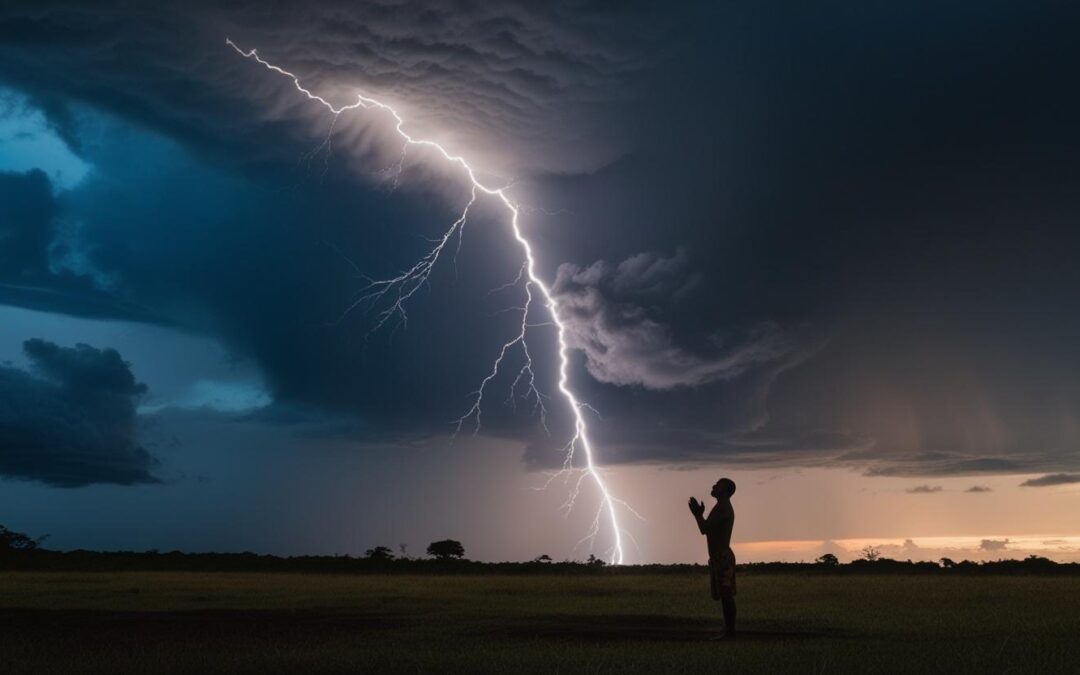I miss the good old Southern thunderstorms. Sure, they can be violent, dangerous, and a little frightening—but there’s something breathtaking in their wild unpredictability. I know I’m not alone in that feeling. There’s something deeply spiritual about sitting on the porch, feeling the rush of wind, the pelting rain, and watching lightning streak across the sky. It may seem odd to find peace in a storm, but in those moments, I feel connected to something far bigger. I feel connected to God’s glory in nature.
A Spiritual Wake-Up Call: Francis Chan’s Crazy Love
A few years ago, I was preparing a message for our youth group. I found myself revisiting the first chapter of Francis Chan’s Crazy Love—a chapter provocatively titled “Stop Praying.” At first, I was alarmed. “Stop praying?” I wondered. But Chan’s message wasn’t about abandoning prayer. It was a call to pause and consider who we’re praying to.
Drawing from Isaiah and Revelation, Chan paints a vivid picture of the throne room of God—a place of unimaginable majesty and awe. It’s a reminder that before we speak, sing, or pray, we should take a moment to reflect on who God truly is. That reflection brings us face to face with God’s glory in nature, scripture, and in our very existence.
A Thunderstorm, A Hymn, and A Heart of Worship
This same spirit of awe is found in the powerful hymn How Great Thou Art. More than just a song, it’s a deep, moving expression of wonder and reverence—a true How Great Thou Art devotional that calls us to worship in response to what we see around us.
But how does a Southern thunderstorm connect to this classic hymn?
Swedish poet Carl Boberg was inspired to write the original version of How Great Thou Art after witnessing the aftermath of a thunderstorm. As he walked and observed the raw energy and beauty of creation, he saw more than just lightning and rain—he saw God’s glory in nature.
His response?
O Lord my God, when I in awesome wonder
Consider all the worlds Thy hands have made,
I see the stars, I hear the rolling thunder,
Thy power throughout the universe displayed.
In this verse, Boberg doesn’t just describe a storm—he recognizes the Creator behind it. He’s engaging in Christian worship and creation-focused reflection. Nature isn’t just background noise—it’s a divine declaration.
Nature as a Catalyst for Worship
We often fail to notice the incredible world around us. What should inspire awe becomes ordinary. Trees, skies, thunder, oceans—they become mundane. But scripture says otherwise. Psalm 19:1 proclaims:
“The heavens declare the glory of God; the skies proclaim the work of His hands.”
After witnessing this, Boberg continued his hymn with these powerful words:
And when I think that God, His Son not sparing,
Sent Him to die, I scarce can take it in,
That on the cross, my burden gladly bearing,
He bled and died to take away my sin.
This How Great Thou Art devotional reminds us that Christian worship and creation go hand-in-hand. We were broken, sinful, and rebellious—but God, rich in mercy, sent Christ not in spite of our sin, but because of it.
Paul says in Romans 5:8:
“But God demonstrates his own love for us in this: While we were still sinners, Christ died for us.”
How can we grasp that truth and not cry out, How Great Thou Art?
A Future Hope, A Present Praise
When Christ shall come with shout of acclamation
And lead me home, what joy shall fill my heart!
Then I shall bow in humble adoration
And there proclaim, “My God, how great Thou art!”
This is not just a song—it’s a testament of worship birthed from revelation. It teaches us that worship doesn’t come from mood or emotion—it comes from an encounter with truth.
Boberg didn’t praise God because he felt like it. He praised God because he had witnessed the Creator’s power. And in doing so, he models the kind of Christian worship and creation-inspired awe we’re all called to experience.
Worship the Creator, Not Just Creation
In today’s world, many are drawn to nature spiritually—but they stop at the surface. They admire the mountains, oceans, and skies, but fail to look beyond to the One who made it all.
This post isn’t just about a thunderstorm. It’s about remembering that God’s glory in nature is meant to point us back to the Creator, not become the focus of worship itself.
So the next time you hear thunder rumble in the distance or see lightning illuminate the sky, let it stir your soul. Let it be more than just a storm. Let it be a call to say:
“My God, how great Thou art.”

